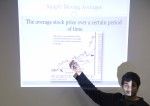The original version of this article contained an error and has been changed. See the bottom of the article for additional information.
A projector lights up the screen in a Bunche Hall classroom with images of graphs, their unintelligible squiggly lines crossing over each other in green, red and blue. The room full of students throws around words like “technical analysis,” “stop loss” and “trend” – the UCLA Undergraduate Investment Society’s weekly meeting has begun.
The club, which aims to educate students about finance and investments, formed in 2007 when then-first-year economics student Carl Abuan, now a 24-year-old marketing manager at Study Mode, an online study tool website, founded it with a floormate.
Many of the members have been investing their own money in stocks since high school, and had a keen interest in the world of finance before ever stepping foot into a meeting, said Shane Sideris, co-president of the club and fourth-year economics student.
Parth Thakkar, third-year mathematics/economics student and vice president of the club, began trading with his own money right after his first year at UCLA.
“I worked two jobs in high school, one in the school cafeteria and one at my mom’s restaraunt,” Thakkar said. “I saved every penny I earned.”
With the help of his father, who matched every dollar he had saved up, Thakkar began trading real money for the first time.
But some of the club’s members, like second-year computer science student Rajyavardhan Pasari, are not pursuing degrees that are directly linked to the field of investment.
Pasari, who is a club officer, was introduced to finance when he interned at a trading company the summer after he graduated from high school.
The experience drew him in, and when he chanced upon the Undergraduate Investment Society’s table at the Enormous Activities Fair during fall of his first year at UCLA, he said he instantly connected with the club and its members.
Abuan still drops in to the club’s meetings occasionally, to see how the club is doing, Sideris said.
“Our first meeting had five people there,” said Abuan, gesturing around him to the room full of more than 20 people.
Abuan said the club is popular because it provides some information that the UCLA economics major does not offer. The economics department, however, does offer an undergraduate course in investing, said William Zame, an economics professor.
This year, Pasari and other members of the investment club will be competing in an online Commodity Trading Challenge put on by the Chicago Mercantile Exchange, the world’s second-largest exchange for futures and options on futures. The club began the preliminary round on Tuesday.
The undergraduate students will trade oil, gold and corn futures, or commodities guaranteed delivery at a stated future date and specified price, on a simulated trading platform against other undergraduate and graduate students around the world.
The competing teams start off with $100,000 in simulated money, and the top 10 percent of teams move on to the championship round. The team that makes the most money wins the first prize.
The challenge is four weeks long and divided into a practice round, preliminary round and championship round of competition, according to the Chicago Mercantile Exchange website. Contestants are provided with all of the trading software they need to compete, and top students are eligible for cash prizes.
The investment society has competed in the challenge twice before, said Roy Choi, co-president of the group and fourth-year neuroscience student.
“Last year we didn’t do too well,” Choi said. The group did not make it past the preliminary round last year.
The group members hope for better results this time around, Sideris said. The group has been making money on their investments in the practice round, he said.
To prepare for this year’s competition, the Undergraduate Investment Society has been carefully following the commodities market and focusing on trading methods most useful for commodities at their meetings, Sideris said. They have formed two teams of five people each, Sideris at the head of one and Choi at the head of the other, where more experienced members who have competed before will help newer members navigate the challenge, Sideris said.
“It’s the sort of thing where if you like it, you like it,” Pasari said. “We really like it,” he added, laughing.
Contact Natalie Delgadillo at ndelgadillo@media.ucla.edu.
Correction: Some club members, like second-year computer science student Rajyavardhan Pasari, are not pursuing degrees that are directly linked to the field of investment.

